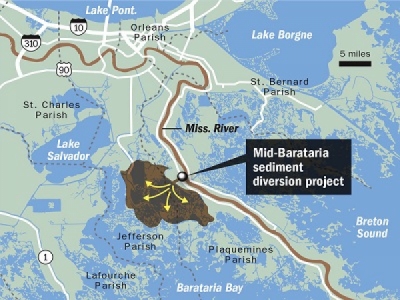
Posted on January 30, 2018
State and federal officials have agreed to cut the permitting process from five to two years for the state’s proposed Mid-Barataria Sediment Diversion Project.
The diversion, which will be located along the west bank of the Mississippi River near Myrtle Grove in Plaquemines Parish, will divert sediment, nutrients and freshwater to build new land, maintain existing marshes and increase area resiliency to sea level rise and storm events.
Johnny Bradberry, chairman of the state Coastal Protection and Restoration Authority, signed a memorandum of understanding along with several federal officials Friday morning to shorten the permitting process.
“Louisiana CPRA has been the driving force of this initiative to streamline environmental and permitting processes to speed up project implementation of Coastal Master Plan projects,” Bradberry said in a statement.
The diversion project, estimated to cost $1.4 billion, aims to build and nourish 10,000-30,000 acres of critical coastal wetlands over a 50-year period.
Restore the Mississippi River Delta, a coalition of national and local conservation organization, issued a statement saying the agreement indicates the state and all parties involved understand the urgency of coastal land loss.
“There have been decades of prior research, planning and permitting at the state and federal levels that have built the groundwork for sediment diversions,” the organization said. “It’s time to get the Mid-Barataria Sediment Diversion constructed, so it can begin rebuilding our coastal defenses sooner rather than later.”
Fishermen and others, however, have expressed concern that diversions.
The Louisiana’s Shrimp Task Force, at a meeting in October in Houma, decided to send a letter to Gov. John Bel Edwards and others emphasizing the potentially negative impact of diversions and supporting the use of dredging to create land.
“We need to push the issue on dredging,” Acy Cooper, task force chairman and president of the Louisiana Shrimp Association, said at the October meeting. “We want to make these dredges start making land and get it done. We want to see where we go with the dredging before we start digging holes in our levees and putting water in our estuaries.”
Source: dailycomet.com





